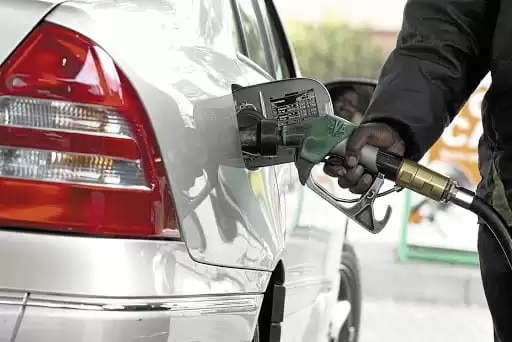

LIQUID GOLD: The price of petrol and diesel goes up again from Wednesday, and will have a knock-on effect on inflation. Pic: SYDNEY SESHIBEDI. 08/04/2005. © Sunday TimesnnPetrol Attendent Samuel Mogadi, attend the customers at the BP petrol station in Hyde Park on Jan Smuts Avenue. The petrol price has gone beyond the R5.00 mark. Pic: Sydney Seshibedi. 8/4/05. © ST.nn
Last updated on September 11th, 2021 at 02:50 pm
Falling fuel prices and collapsing demand are likely to outweigh the effects of a weaker rand, and could push consumer inflation towards 17-year lows, according to investment bank BNP Paribas.
BNP Paribas sees inflation averaging just 2.8% this year — below the SA Reserve Bank’s target range of between 3% and 6% — leaving the Bank with further room to cut interest rates, as SA continues to face economic pressure amid the coronavirus lockdown.
The Bank has already cut rates three times in 2020 as both inflation and economic growth, which were already under pressure in a lacklustre economy, are expected to continue falling in the wake of the effects of the virus on the global and domestic economy.
Its last 100 basis points (bps) cut, which took the repo rate to 4.25%, was made at an out-of-schedule monetary policy committee (MPC) meeting in April.
The Bank’s next scheduled MPC meeting is set for May 19-21. BNP Paribas senior economist Jeffrey Schultz said in a note that the case for a further 125 bps in cuts this year is strong, with BNP Paribas expecting the next 75-100 bps in rate cuts to be delivered at the scheduled May meeting.
Falling global oil prices, which have collapsed in response to both oversupply dynamics and falling global activity and demand during the pandemic, supports the outlook for inflation, he said.
“For a net oil importer like SA, this is good news and has created room for very strong deflation in domestic fuel prices,” he said, adding that it has helped to maintain healthy trade surpluses, which will help to keep the current account deficit in check this year.
The effect of “damaged” demand channels will also have an important bearing on underlying inflationary pressures, outweighing any concerns over the effect of a weaker rand on prices, Schultz said.
To add to this, BNP Paribas’s assessment of core inflation — inflation excluding food and fuel prices — suggested that price items sensitive to economic activity, such as restaurants, hotels and maintenance and repair prices, are likely to slip into deflation territory.
These factors, among others, suggest that headline consumer inflation could average the “near historic low” of 2.8% in 2020, he said.
(BusinessDay)
UNICEF reported that, nearly 2900 people died of cholera across Eastern and Southern African countries while children suffer most greatly…
Enza, based in the United Arab Emirates, obtained $6.75 million in initial investment funding from Algebra Ventures and Quona Capital.…
US Secretary of State Marco Rubio ordered South African Ambassador Ebrahim Rasool to leave America by March 21 because he…
Early 2025 ends with IPL fever in India and cricket fans receive good news of an international schedule full of…
National teams from Africa advance their World Cup qualification pursuit as they take part in Matchday 5 of the qualifiers.…
Creative Africa Nexus (CANEX) is running the Book Factory Prize for Publishing in Africa again to award $28,000 to African…
This website uses cookies.